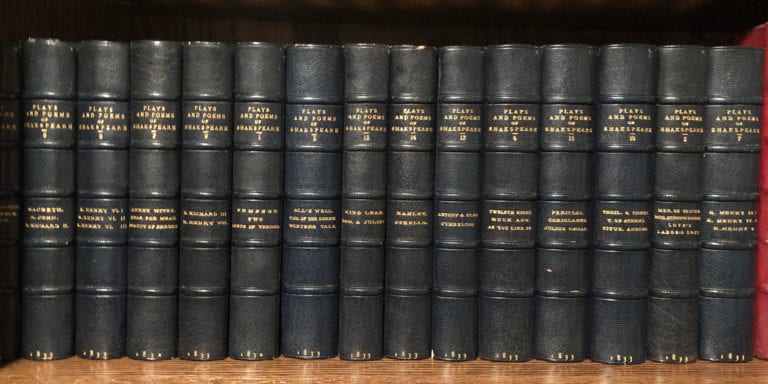
Read Part 1 here.
The Young Bookseller pulled down the toggle on the wall and the office lights switched off. A bit of light from outside the office seeped in. The ring picked up more of it than the objects which hung upon the wall with it. It seemed to have its own warm soft glow.
He closed his eyes and again breathed in deeply and then slowly exhaled. When he opened them, the golden object was still there.
It was real.
This morning had been real.
He reached for the knob and drew the office door toward him. He pulled it into the jamb, and when the latch engaged, he let go. He turned and walked up the row of Histories that led to the front of the shop. He reached out and put two fingers on a book’s spine. As he continued, he touched hundreds of books as he made his way. His touch upon the books made a soft sound.
“Taakk taakk tak tak tak…”
“I should try to find the owner of that ring,” was his first thought when he got to the area near the front door. “But I do not want to just hang up a sign in the store that says ‘Golden Ring Found.’ That would be awkward. Beside if the owner knew the ring was lost here in the shop, why, they would just stop in or ring me up on the phone…’ring me up…’ That is a silly turn of phrase.”
In those days, the town in which the bookstore resided was much smaller than it is today. But it had its own newspaper. Almost everyone in town would receive a copy of it every day. A paperboy or papergirl would toss the rolled up paper near the front door of every home or business that subscribed to it. Today’s copy was on the sales counter. It was not far from the two stacks of Shakespeare books that still stood upon it as well. He gently slid those books off to the side to make space to read the paper.
He slid off the rubber band which kept it rolled. It made a soft rattling sound as he did this. He unrolled and then unfolded that morning’s news and spread it upon the counter. The small bundle was now quite large. It nearly covered half of the counter. He would always read the front page first. Upon that page were the stories of the town, county, state, country and the world which the newspaper’s editor felt were the most important and interesting to the readers of the big little town. That is where the Young Bookseller usually began.
But this day, he turned the newspaper over. For it was in the back section of the newspaper that dozens and dozens of classified advertisements were printed every day.
He unfolded it and looked down at the very last page of that day’s newspaper. There was a full-page advertisement on the final page for a furniture store. “Biggest Sale of the Year!” It was ALWAYS the biggest sale with those companies. Pictures of sofas and beds and chests of drawers and dining room tables and chairs filled the page.
In those times, when unfolded, the newspaper measured twelve and one-half inches wide and forty one and a half inches tall.
He grasped the final page between his thumb and forefinger and lifted. He turned that page open and spread it before him. The dimensions of today’s paper doubled. It became twenty-five inches wide.
This was the end of the Classified Ad section. It was always quite large. The beginning of that section was five pages back. “Help Wanted—Full Time” “Help Wanted—Part Time” advertisements were published there. So, if you were looking for a job that was a good place to start. There were sections for Automobiles New and Automobiles Used, Real Estate For Sale, Apartments for Rent, Legal Notices, Estate Auctions … and so on.
But today he wanted to look at the Want Ads. That section was always the last part of the Classifieds. These were the pages he was studying. The Want Ads were for people who “wanted” things. Usually it was either they wanted to buy something or to sell something.
He looked down at the two vast paper pages below him.
Over one hundred little boxes with tiny printed letters in each box looked back at him. He ran his forefinger down the first column and then up the second. “Antiques and Collectibles,” “Boats,” “Cats For Sale,” “Dogs For Sale,” “Farm Items,” “Firewood,” “Furniture.”
Up and down, down and up.
“Giveaways,” “Garage Sales,” …
He had often been here before. He studied the Garage Sales in hopes one or more would have books for sale. If the Garage Sale sounded intriguing, he would circle it in red pencil. But today he was looking for something else. He would return to study these later.
… “Handyman,” “Lawn & Garden,” “Lost & Found.”
That is what he was looking for!
Beneath that heading, there were 5 ads in little boxes. He read each one:
“Lost wallet…”
“Lost bunch of keys…”
“Lost hat…”
“Found cat. Tan and white…”
“Found bicycle…”
No one had lost a ring. At least not in this day’s newspaper.
He decided he should write up and submit a “Ring found…” ad.
He picked up the telephone and punched the buttons on the black plastic phone which hung on the wall behind the sales counter. In those times there were only seven numbers in everyone’s telephone number.
369-3399
“Hello! Classified ads,” the voice in the earpiece spoke.
“Yes, I would like to place an ad in your lost and found.”
“Lost or found?”
“Lost…I mean found. I found a ring.”
“That’s very nice of you. The Lost & Found ads are free here at the Paper. We do it as a public service.”
“Oh. What should I say?”
“Well, is it valuable?”
“I am not sure. Perhaps. It is a…”
“Don’t tell me!”
“What? Why?”
“If you tell the wrong person exactly what you’ve found, that person might just say: ‘I lost a ring just like that!’ When, in fact, they’d never lost a ring at all!”
“Oh. What should I do?”
“We offer Secret Box ads. You place an ad stating that you found a ring—did you find it in town?”
“Yes.”
“You place an ad saying: ‘Ring found in town on such and such a date. If you’ve lost a ring, please reply to box number’—I’ll give you that number. Then you say: ‘Please provide a complete description of the ring and where you think you might have lost it.'”
“Oh. Ok.”
“I’m afraid we do charge for the Secret Box. Fourteen days for seven dollars. You can call any day and see if anyone has responded to your ad.”
“How does that work?”
“People usually mail a letter to us here with your box number on it. Sometimes they drop them off. You call us. We check your box. If there is anything in it we tell you and you can come in and pick up whatever is in your box.”
“Ok.”
So together with the newspaper representative an ad was written.
The Young Bookseller sighed and folded up the newspaper. It had been a very confusing morning. He looked at the two stacks of Shakespeare books on the edge of the counter. They were lovely. They would look just right at…home!
So he carefully set them in two white banker’s boxes. The books did not fill either box, so he tucked some old towels around them to keep them from bumping one another. He put a lid on each box and then carried them through the front door. The bell jingled and jangled as he pushed it open with his shoulder. He stepped off the curb and crossed the tiny parking lot to the farthest parking spot. The Old Bookseller had taught him that the customers should get the best spots.
“You’re there all day! Don’t make all your customers walk around your old truck to get to the front door.”
It was indeed an old truck the Young Bookseller used to pick up books from house calls or auctions or other bookstores or…anywhere else he could find good old books. It was an 11-year-old Ford F-150 pickup with a cap over the bed to keep the books dry. Its bright white paint had faded to a dull flat milky white patina.
He went to the passenger side door and put the boxes on the front seat.
“I know just the spot on my book shelves for these. I will give them a good home…for a while.”
…For a while…
Even at that young age, he knew already that no one owns a book forever. You take a book home and care for it as long as you can. A time will come when you need to find a new home for some or all your books. There comes a time when you work to find the next “good home” for your own books. If you do well by them, your books can get to their next place—the next step toward forever.
And so the day then became a little more normal. He bought some more books. He sold some books. It seemed he always bought more books than he sold. Well, it more than “seemed.” Far more books came in than went out. He had turned his garage at home into a storage room for the books that could not fit on the shelves. He foresaw the day would come—in the not too distant future—when he would lift the roll up garage door and be faced with a solid mass of filled boxes filled with books. Floor to ceiling. Front to back. Side to side.
“I wonder if I can put more bookcases anywhere in this shop?” he thought. “Perhaps over there…”
He had built every bookcase in the shop. Measuring and sawing and staining and hammering in the small paved loading drive just outside the back door. It would be fun to build some more. It would be especially fun because it would mean he could put more books into the store!
Then he looked up at the clock up on the wall. It was 5:55PM and the store’s hours posted on the sheet of white paperboard on the front door stated the shop was open Tuesday through Sunday 10-6. So he was there every day except for Mondays. The sign said: “Closed Mondays (or by appointment.)” But he often went in on Mondays anyway to catch up on things. And if he was there the “Open” sign was turned around—just in case someone wanted to come in and look at books.
Closing time. He walked around the store making sure everything was all right. Of course it was. What can wrong in an old bookstore?
He turned the sign the sign on the front door so the side that read “Closed” faced outside and the side that said “Open” faced him.
He went behind the counter and picked the battered green metal fishing tackle box. He carried them and the clipboard listing the “payouts” and the “daily sheet” back to his little office in the far corner near the rear door on which a sign read “Emergency Exit Only. Alarm will sound.”
There was no alarm actually. He could not afford to install one. He hoped the sign would deter anyone from exiting that way. They might try to abscond with some books under their arm!
He unlocked the office and stepped in. The ring looked back at him hanging from the far wall—which was not very far for the office was indeed a very small room. He had measured it to see where best he could fit his father’s desk in it. It was exactly eleven feet wide and seven feet deep. Even in the darkened office the ring again gave off a soft warm glow.
After turning on the office lights, he sat at his desk which was piled with paper. For although he was a very young man, the mess upon the desk seemed far older. Bills and book catalogs, letters and notes, to do lists…
He set the metal box upon the desk, opened it and withdrew all the checks and bills from the bottom. He counted the green paper money. $111. He counted the coins. Pennies, nickels, dimes and quarters. $17.19. He added up the checks that had been written to the store that day. $55.77. He added up the credit card receipts for the purchases made by customers using that way of paying for books. $33.11. He then added up all the handwritten receipts he had written that day. He had made thirteen sales. They added up to $230.07. Then he totaled the money he had paid for books brought to the store that day. He had bought books from 7 people. That total was $113 exactly—including the $9 he paid to the old woman with the Shakespeare books. He added them all together. $330.07. He subtracted the $100 in cash and change he started with every day—the “bank.” The little bookstore had sold 43 books today. Not bad. That would cover the rent and gas for the truck and some food and contribute to his weekly self-imposed salary of $150. There were times he could not actually cash his own paycheck due to lack of funds. He counted back in exactly $100 in cash and coin for tomorrow’s starting “bank.” The rest of the cash and checks were added up. He wrote up a deposit slip. $28.00 cash, $0.19 coin and $55.77 checks. He made a second deposit slip for credit card receipts. He would slip those in the bank’s night deposit drawer on the way home. That drawer was in a heavy metal slab built into the bank buildings brick wall.
As he got to his office door, he looked once more at the ring upon the wall. He switched off the office light. The ring still glowed softly and warmly across the room as he pulled the door shut.
After that he went home. He turned on the stove and put his mother’s old heavy cast iron black skillet (she had called it a “spider”) on the burner. He sliced a little butter off the end of a quarter pound stick and put it in the pan. Between two pieces of Wonder Bread he placed a couple slabs of Velveeta “cheese.” The butter had melted, and he swirled it around a bit so it would spread evenly. He set the bread atop the butter. A grilled cheese sandwich was often the evening meal. He opened the fridge and withdrew a short squat bottle of Piels beer. At $4.99 per case, it was very affordable. And it tasted ok. He took a sip and then went out to the truck and carried in the boxes containing the old woman’s books inside.
“Gee, I must be tired. These seem heavier than when I carried them out of the store!”
He set the boxes on the floor in front of his favorite bookcase. He settled himself on the floor and removed book after book from those shelves. Some would go back to the store for someone else to take home. Some he would relocate around the house somewhere.
He removed the lid and began lifting the Shakespeare books out of the first box.
“I don’t remember these at all,” he thought. “This is polished leather! And this calf!”
He recalled the books he had stacked upon the counter. They had been nice editions. Mostly cloth. Some were leather, but they certainly didn’t seem as beautiful as these.
He removed the books from the other box and stared at the stacks on the floor before him. He counted each book. 33 just like he recalled.
“I feel terrible. These are very special. Stunning! But she had refused the offer I made her and insisted on taking less.”
BEEP!!! BEEP!!! BEEP!!!
The kitchen!
He jumped up and rushed to the kitchen. Smoke was pouring up from the skillet. The smoke alarm continued screaming. He slid the pan off the burner and turned off the stove. He opened all the windows in the room and turned on the exhaust fan. He got a spatula from the drawer and inspected his dinner. One side of the sandwich was black and smoking.
“Hmmm…not too bad, I guess. I like them well done.”
He slipped the drippy cheese sandwich onto a plate and returned to the bookcase in the other room. Blessedly, the smoke alarm soon stopped screaming.
There were no books on the floor. All the Shakespeare books were on the shelves, placed carefully and arranged tastefully.
Looking down at beer where he’d left it on the floor, he thought: ” That was my first. I must be losing it.”
He sat on the floor before the books and looked at them while he nibbled at his sandwich and sipped the beer.
When he’d finished and cleaned up the kitchen and himself, he headed for bed. He picked up one of the books he was reading from the stack on the bedside table and began to read.
Then he was dreaming. A tall lithe silver barked tree alone on a mountainside was swaying sinuously in a steady breeze. Its leaves were tan and sere. Only a Beech has winter leaves like that. It had a wide skirt of branches a few feet off the ground. It shape gracefully tapered up to it s pinnacle. He approached it and saw dozens of ancient books strewn about it like gifts under a Christmas tree. The books were all bound in raw wooden thin bark boards. As he got closer, the tree stopped swaying and inclined toward him. She spread her lower branches in an arc, and he felt he was being offered the books below her. A sunrise behind him broke the horizon and the tree’s tan leaves turned golden. A woman’s voice spoke:
“These are yours.”
And then he awoke. The bedside light was on. The book he had been reading lay splayed upon his chest. He caught a whiff of burnt bread then reached over and switched off the light. He rolled on his side and curled up, and the next he knew it was morning.
He started his coffee and let out the dogs—Merry and Pippin—one at a time. If they both went out loose together, they would run away for hours.
On his way out to work, he passed by the shelves where the Shakespeare books resided. Oddly, they were no longer even. He walked over and pushed back the books that were out too far and pulled out the books that were too far back. When they were all even, he gave them a little pat and headed off to the bookstore.
End Part 2.

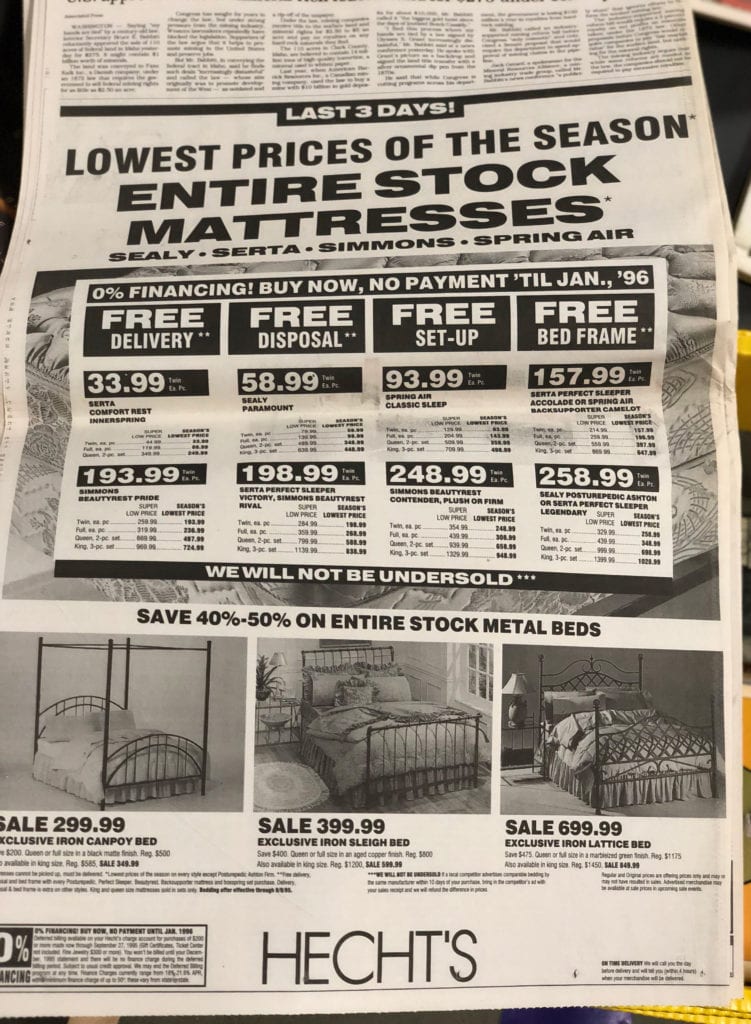
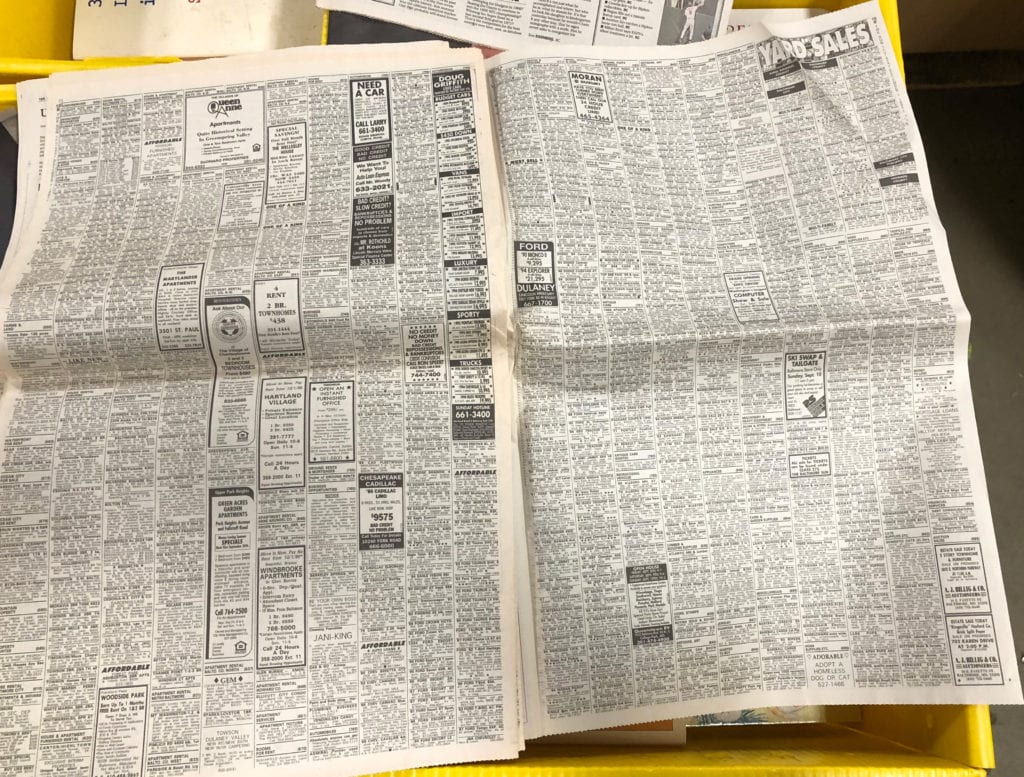
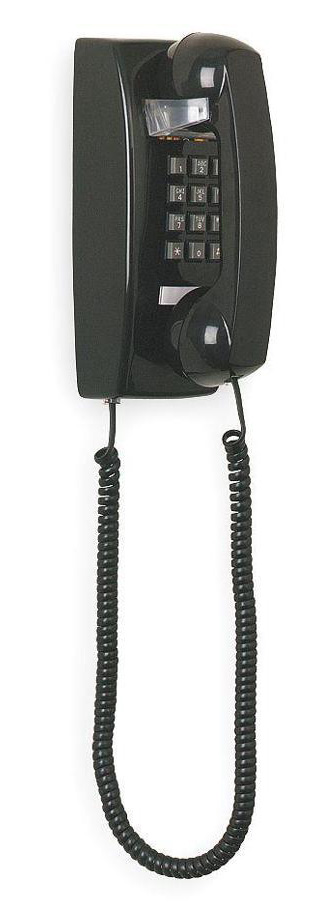
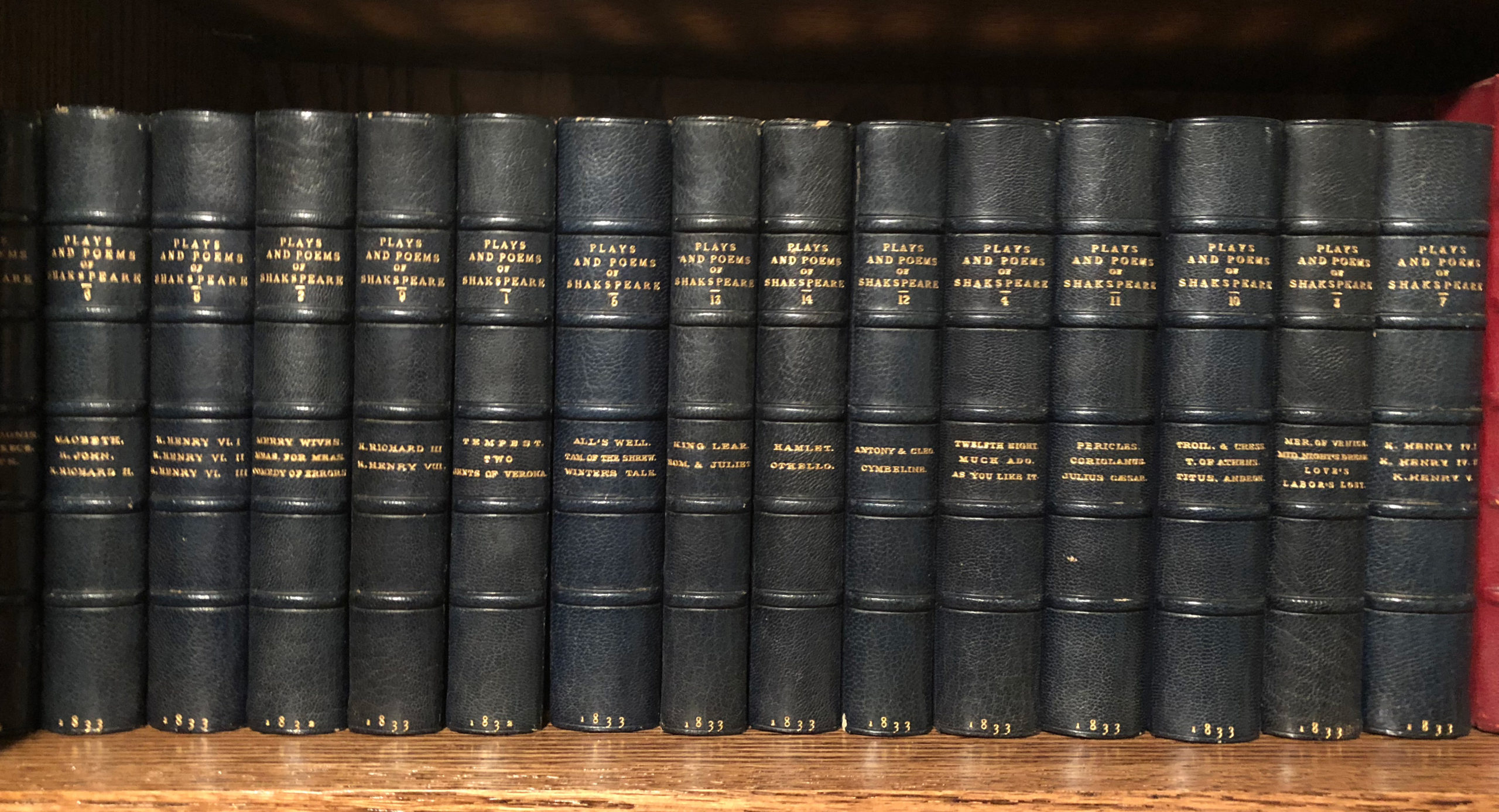

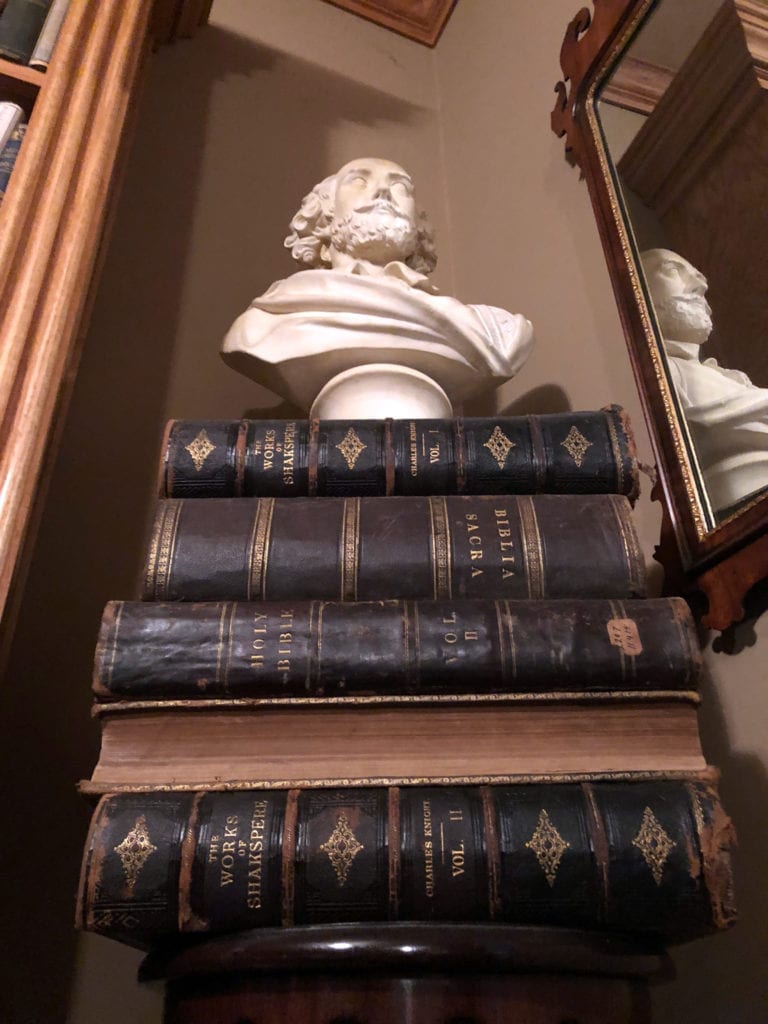
[…] Read Part 1 here and Part 2 here. […]
[…] Part 2 […]
[…] Part 2 […]